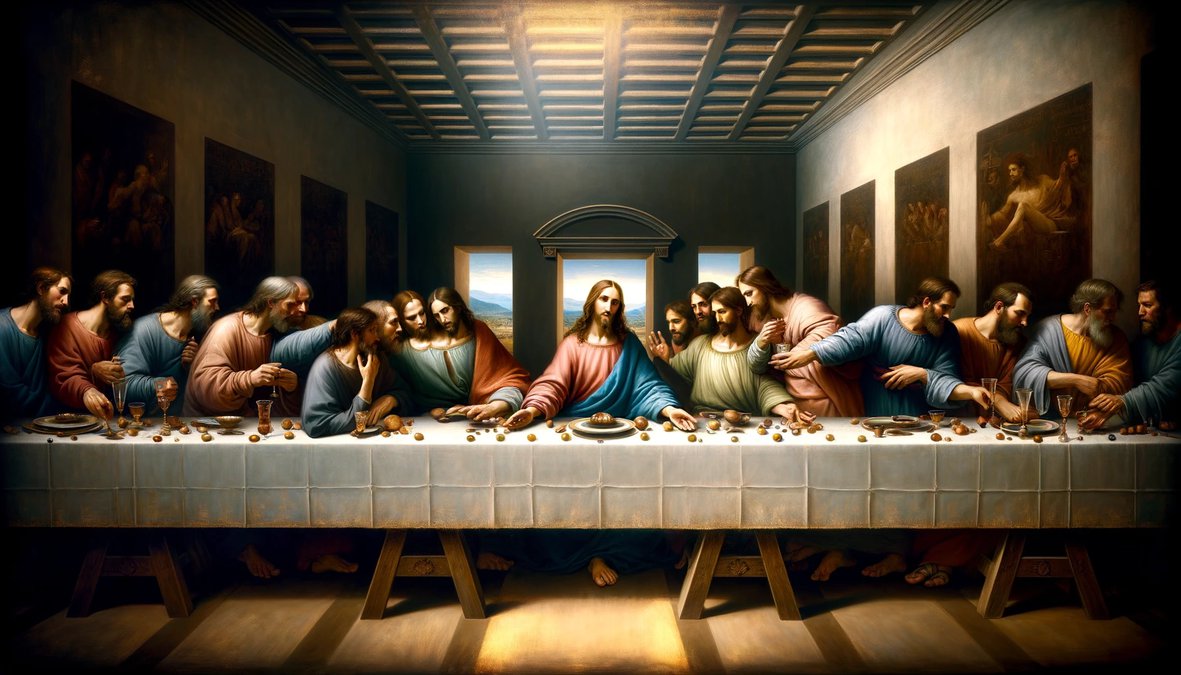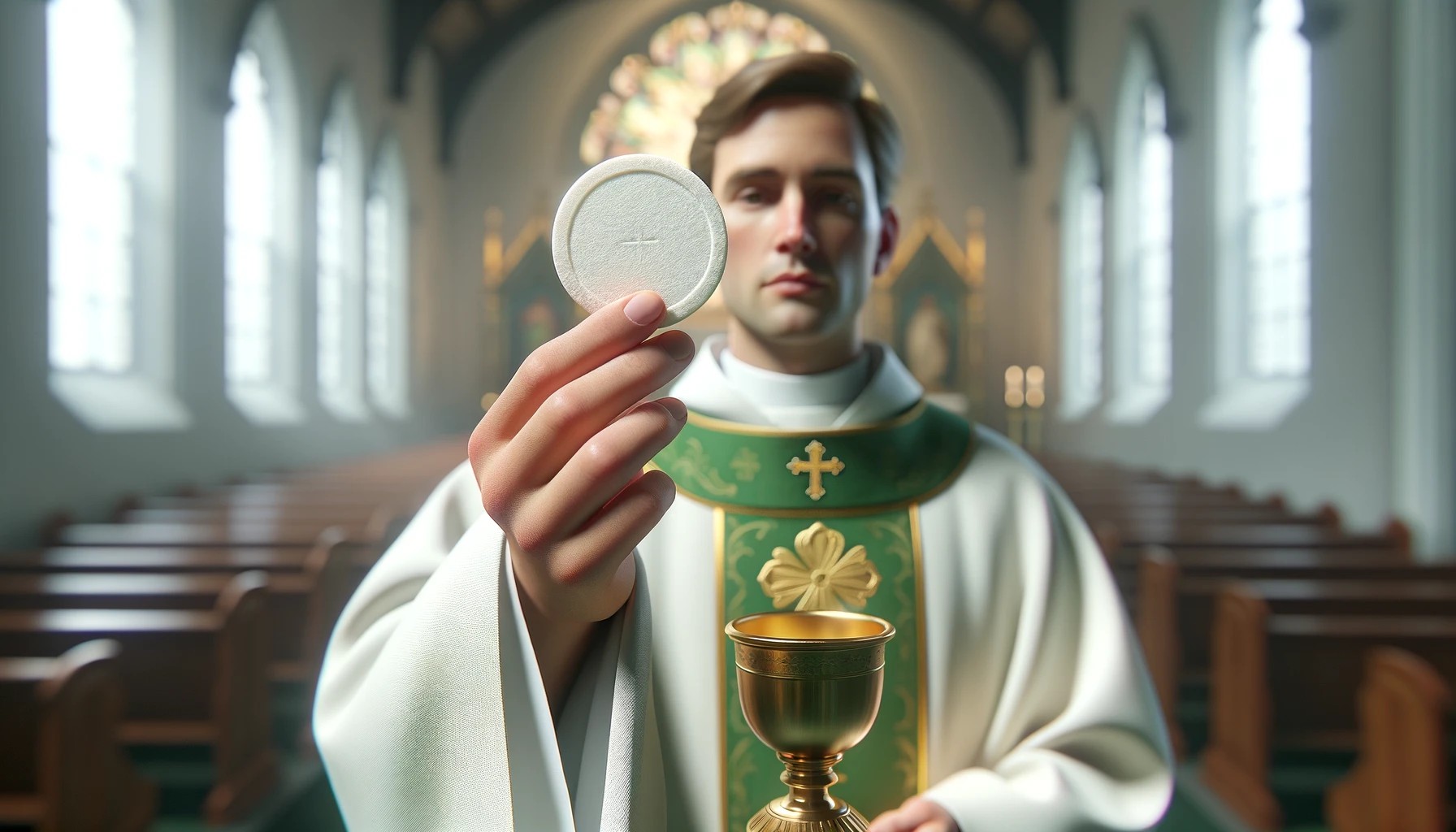Home>Theology and Spirituality>What Do You Say When Taking Communion?


Theology and Spirituality
What Do You Say When Taking Communion?
Published: February 19, 2024
Peter Smith, Editorial Director at Christian.net, combines deep insights into faith, politics, and culture to lead content creation that resonates widely. Awarded for his contributions to religious discourse, he previously headed a major organization for religious communicators, enhancing dialogue on faith's societal impacts.
Discover the proper words to say when taking communion and deepen your understanding of theology and spirituality with our insightful guide. Explore the significance and meaning behind communion rituals.
(Many of the links in this article redirect to a specific reviewed product. Your purchase of these products through affiliate links helps to generate commission for Christian.net, at no extra cost. Learn more)
Table of Contents
Introduction
When it comes to the act of taking communion, whether in a church, chapel, or other spiritual settings, the words spoken during this sacred ritual hold profound significance. Communion, also known as the Eucharist or the Lord's Supper, is a central sacrament in Christianity, symbolizing the remembrance of Jesus Christ's sacrifice on the cross and the unity of believers in the body of Christ. The words spoken during communion serve as a powerful expression of faith, gratitude, and reverence for the spiritual nourishment received through this sacred practice.
As we delve into the topic of what to say when taking communion, it's essential to recognize the diverse cultural and religious contexts in which this ritual is observed. From the traditional responses commonly used in Christian denominations to personalized expressions of devotion, the words spoken during communion reflect the deep spiritual connection between individuals and their faith.
Throughout history, communion has been a unifying practice that transcends cultural and geographical boundaries, resonating with believers around the world. The act of partaking in the bread and wine, or symbolic elements representing the body and blood of Christ, is a solemn and deeply meaningful experience for many. Whether it's a reverent whisper, a communal recitation, or a personal prayer, the words spoken during communion encapsulate the essence of faith, humility, and spiritual communion with the divine.
In this article, we will explore the significance of communion and the various responses associated with this sacred ritual. From the traditional phrases used in Christian liturgies to the personalized expressions of devotion, we will delve into the diverse ways in which individuals and communities engage in this profound act of spiritual communion. Additionally, we will examine how different cultural and religious traditions shape the practice of communion, shedding light on the rich tapestry of beliefs and expressions that encompass this timeless sacrament.
Read more: When Do Baptists Take Communion
Understanding the significance of communion
Communion, a central sacrament in Christianity, holds profound significance as a symbolic representation of the Last Supper, where Jesus shared bread and wine with his disciples. This act of sharing a meal with his followers became a powerful symbol of sacrifice, unity, and spiritual nourishment. The ritual of communion is deeply rooted in the Christian faith, signifying the remembrance of Jesus Christ's sacrificial death on the cross and the promise of redemption for believers.
At its core, communion embodies the spiritual connection between individuals and their faith community. It serves as a tangible expression of unity, as believers partake in the symbolic elements of bread and wine, representing the body and blood of Christ. This act of partaking in the Eucharist fosters a sense of shared identity and belonging within the body of Christ, transcending individual experiences and uniting believers in a collective expression of faith.
Furthermore, communion is a profound act of remembrance, inviting participants to reflect on the life, teachings, and ultimate sacrifice of Jesus Christ. It serves as a poignant reminder of the enduring love and grace extended to humanity through Christ's redemptive work. The ritual of communion thus becomes a sacred moment of introspection, gratitude, and spiritual renewal, as individuals contemplate the profound implications of Christ's sacrifice for their lives.
In addition to its symbolic significance, communion also embodies the concept of spiritual nourishment. The act of partaking in the bread and wine is believed to impart spiritual sustenance, symbolizing the sustenance of the soul through the life-giving presence of Christ. This spiritual nourishment is thought to strengthen and sustain believers on their faith journey, providing sustenance for the challenges and trials encountered in life.
Overall, the significance of communion extends far beyond a mere ritual; it encapsulates the essence of Christian faith, unity, remembrance, and spiritual nourishment. As believers partake in this sacred sacrament, they are invited to enter into a profound communion with the divine, embracing the transformative power of Christ's sacrifice and the unifying bond shared among fellow believers.
Traditional responses when taking communion
In the context of Christian worship, the act of taking communion is often accompanied by traditional responses that hold deep spiritual significance. These responses, deeply rooted in liturgical practices, serve as expressions of faith, reverence, and communal unity during the sacred ritual of partaking in the Eucharist.
One of the most widely recognized traditional responses during communion is the recitation of the Lord's Prayer. As believers gather to receive the bread and wine, the communal recitation of this sacred prayer serves as a unifying expression of devotion and acknowledgment of God's sovereignty. The Lord's Prayer, also known as the Our Father, embodies the foundational principles of Christian faith, emphasizing themes of divine providence, forgiveness, and the coming of God's kingdom. By reciting this prayer in unison, participants in the communion service affirm their shared faith and dependence on God's grace.
In many Christian denominations, the act of taking communion is accompanied by the recitation of specific liturgical phrases or responses. These may include the proclamation of faith, such as the Nicene Creed or the Apostle's Creed, which articulate the core beliefs of the Christian faith. Additionally, the use of traditional hymns and psalms during communion underscores the spiritual significance of the ritual, providing a melodic backdrop for collective worship and reflection.
Furthermore, the exchange of greetings and blessings among worshippers and clergy members is a common traditional response during communion. This exchange fosters a sense of community and mutual support, as individuals extend words of peace, love, and spiritual well-being to one another. The exchange of blessings, often accompanied by the words "The peace of the Lord be with you," reinforces the communal bond shared among believers and serves as a tangible expression of goodwill and unity within the faith community.
In some traditions, the presiding clergy may offer specific prayers of consecration and thanksgiving before the distribution of the bread and wine. These prayers, steeped in sacred language and theological significance, serve to sanctify the elements of communion and invoke God's presence among the worshippers. The solemn and reverent tone of these prayers underscores the sacred nature of the Eucharist and invites participants to approach the ritual with humility and awe.
Overall, the traditional responses during communion encompass a rich tapestry of liturgical expressions, prayers, and communal gestures that embody the spiritual depth and communal unity inherent in this sacred sacrament. These traditional responses serve to enrich the worship experience, fostering a sense of reverence, unity, and spiritual communion among believers as they partake in the timeless ritual of the Eucharist.
Personalized responses when taking communion
In addition to the traditional liturgical responses observed during communion, individuals often engage in personalized expressions of faith, gratitude, and devotion when partaking in this sacred ritual. These personalized responses reflect the unique spiritual journeys, experiences, and expressions of faith embraced by individuals as they approach the communion table.
One common personalized response during communion is silent prayer and reflection. As individuals receive the bread and wine, many choose to engage in a moment of private prayer, expressing their personal thoughts, emotions, and supplications to God. This silent communion with the divine allows individuals to offer their heartfelt gratitude, seek spiritual guidance, and reflect on the significance of Christ's sacrifice in their lives. It serves as a deeply personal and intimate expression of faith, allowing individuals to connect with the divine in a profound and individualized manner.
Furthermore, some individuals may choose to recite personal prayers or devotional expressions silently as they partake in the elements of communion. These personalized prayers may encompass expressions of thanksgiving, petitions for spiritual strength, or reflections on the transformative power of Christ's love and grace. By incorporating personal prayers into the communion experience, individuals infuse the ritual with their unique spiritual perspectives and deepen their sense of connection with the divine.
In certain worship settings, individuals may also engage in spontaneous vocal expressions of gratitude and praise during communion. This may take the form of whispered words of thanksgiving, expressions of awe at the redemptive work of Christ, or heartfelt exclamations of faith and surrender. These spontaneous vocal responses serve as authentic and unrestrained expressions of individuals' faith and reverence, adding a deeply personal dimension to the communal act of partaking in the Eucharist.
Moreover, the act of receiving communion can evoke profound emotions and spiritual experiences for individuals, leading to tears, smiles, or other non-verbal expressions of reverence and gratitude. These emotional responses serve as authentic manifestations of individuals' spiritual encounters during communion, reflecting the depth of their faith and the impact of the ritual on their hearts and souls.
Overall, personalized responses during communion encompass a diverse array of individual expressions, including silent prayers, personal devotions, spontaneous vocal expressions, and emotional responses. These personalized responses enrich the communion experience, allowing individuals to engage with the sacred ritual in a deeply personal and meaningful manner, and to forge a profound spiritual connection with the divine.
Exploring different cultural and religious practices related to communion
The practice of communion, known by various names such as the Eucharist or the Lord's Supper, extends beyond the boundaries of Christianity, encompassing a rich tapestry of cultural and religious traditions around the world. While the core symbolism of communion remains rooted in the remembrance of Christ's sacrifice and the spiritual nourishment it represents, the specific customs, rituals, and beliefs associated with communion vary across different cultural and religious contexts.
In the Roman Catholic tradition, communion holds a central place in the liturgical worship, with a strong emphasis on the doctrine of transubstantiation, wherein the bread and wine are believed to undergo a profound spiritual transformation into the body and blood of Christ. The act of receiving communion, known as the Holy Eucharist, is regarded as a sacred and transformative encounter with the divine, fostering a deep sense of reverence and spiritual communion among the faithful.
In Eastern Orthodox Christianity, the practice of communion, or the Divine Liturgy, is characterized by its richly symbolic and ceremonial nature. The use of intricate liturgical vestments, elaborate rituals of preparation, and the distribution of communion through a common spoon reflects the emphasis on the mystical and communal aspects of the Eucharist. The faithful partake in communion as a profound expression of their union with Christ and fellow believers, embodying the spiritual interconnectedness of the body of Christ.
Within Protestant traditions, diverse practices related to communion emerge, reflecting the theological diversity and historical developments within the Protestant Reformation. While some Protestant denominations adhere to the concept of consubstantiation or spiritual presence in communion, others emphasize the symbolic nature of the ritual, focusing on its role as a memorial of Christ's sacrifice and a communal expression of faith.
Beyond Christianity, communion-like rituals and practices are observed in various cultural and religious traditions. In the Jewish faith, the Passover Seder involves the sharing of symbolic foods and the retelling of the Exodus story, embodying themes of liberation, remembrance, and communal fellowship. Similarly, in Hinduism, the practice of prasad involves the sharing and consumption of consecrated food offerings as a means of spiritual communion and divine grace.
In indigenous and tribal cultures, communal feasts and rituals centered around the sharing of food and drink serve as expressions of unity, gratitude, and spiritual interconnectedness within the community. These diverse cultural and religious practices related to communion underscore the universal human longing for spiritual nourishment, communal fellowship, and the remembrance of sacred narratives, transcending cultural and religious boundaries.
The exploration of different cultural and religious practices related to communion reveals the profound and universal human yearning for spiritual communion, unity, and the remembrance of sacred narratives, transcending cultural and religious boundaries.
Read more: When Do You Take Communion At Church
Conclusion
The act of taking communion transcends mere ritualistic observance; it embodies the profound spiritual connection between individuals and their faith, fostering unity, remembrance, and spiritual nourishment. Whether in the context of traditional liturgical responses or personalized expressions of faith, the words spoken during communion encapsulate the essence of devotion, gratitude, and reverence for the transformative power of Christ's sacrifice.
The traditional responses during communion, including the recitation of the Lord's Prayer, the proclamation of faith through creeds, and the exchange of greetings and blessings, serve as communal expressions of unity and reverence. These time-honored traditions enrich the worship experience, fostering a sense of shared identity and spiritual communion within the faith community.
In contrast, personalized responses during communion, such as silent prayer, personal devotions, and spontaneous vocal expressions, allow individuals to engage with the sacred ritual in a deeply personal and meaningful manner. These individualized expressions of faith and gratitude add a unique dimension to the communion experience, reflecting the diverse spiritual journeys and encounters with the divine.
Furthermore, the exploration of different cultural and religious practices related to communion reveals the universal human longing for spiritual communion, unity, and the remembrance of sacred narratives. Across various traditions, the symbolism of communion resonates deeply, embodying themes of sacrifice, fellowship, and spiritual interconnectedness.
In essence, the words spoken during communion, whether steeped in tradition or personalized in nature, serve as poignant expressions of faith, gratitude, and reverence. They encapsulate the timeless significance of the Eucharist as a sacred sacrament that unites believers in the remembrance of Christ's sacrifice and the spiritual nourishment it imparts. As individuals and communities partake in this sacred ritual, the words spoken during communion become a testament to the enduring power of faith, unity, and the transformative love of the divine.














